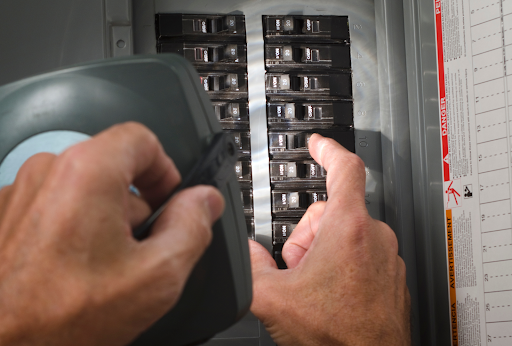Does the power at your house keep cutting out? If you find yourself taking frequent trips to your breaker panel to reset your circuit breaker, it may feel like you’ll never get to the bottom of the problem.
Many electrical systems experience the same three problems that can cause a tripped circuit breaker. In this blog, we’ll discuss these three common causes to help you finally answer why the circuit breaker keeps tripping.
Why Do Circuit Breakers Trip?
Before diving into what causes circuit breakers to trip, it’s essential to understand why. Your home’s circuit breaker is a safety mechanism that shuts off the flow of electricity at individual circuits whenever it detects a fault. When your circuit breaker trips, you’ll need to locate your electrical panel or fuse box to reset the breaker.
While a tripped breaker can feel inconvenient, it’s worth noting that your circuit breaker protects your electrical circuits—and, essentially, your home. Without circuit breakers or fuses, our homes would be more susceptible to electrical fires and other potentially harmful accidents.
Let’s dive into common reasons that could explain why your circuit breaker is tripping frequently.
- Circuit Overload
The most common reason for a frequently-tripping circuit breaker is a circuit overload. An overloaded circuit occurs when an electrical wire or circuit receives more electrical current (or amperage) than it can withstand. A circuit overload can also happen due to loose connections or corroded wires.
Testing For Circuit Overload
It can take trial and error to know if you have an overloaded circuit. When your circuit trips, unplug and turn off the switches to all appliances or devices in the area where the circuit tripped. After resetting the breaker, plug the devices back in one at a time and turn on the switches. An overloaded circuit is likely to blame if the breaker trips before you plug in all your devices. You may want to try replugging your devices in a different order to know what caused the overload.
- Short Circuit
If you checked for an overloaded circuit, you might still be asking in frustration why the circuit breaker keeps tripping. If so, a short circuit could be to blame.
Short circuits occur when active electrical wires touch neutral wires. When an electrical short happens, a large amount of electricity surges through the wires, causing your circuit breaker to trip. Active and neutral wires can touch if the wires are damaged or loose.
How do you test for a short circuit? Unplug all of the appliances and devices in the affected area. If your circuit trips after plugging in a certain appliance, there may be a short in its wiring. Steer clear from that specific appliance until it has been repaired or replaced, as short circuits can lead to electrical shock.
- Ground Fault
If you’re still wondering why your circuit breaker is tripping frequently, the problem may be a ground fault. A ground fault can occur when active or hot wires touch ground wires, a rounded portion of the junction box, or a grounded part of a specific appliance. Ground faults can also occur if water from a leak or pipe winds up in a switch box or one of your outlets. When a ground fault happens, there is a surge in electricity—and, of course, your circuit breaker will trip.
Ground faults used to be a significant cause of electrocution. However, ground fault circuit interrupters (or GFCIs) have fortunately helped prevent this problem from occurring. In the event of a ground fault, a GFCI will immediately shut off your electrical power.
Call in Professional Assistance
After troubleshooting, you may still be asking, “Why does my circuit breaker keep tripping?” If this is the case, it’s time to give the experts at Staley Electric a call. Whether you have a broken circuit breaker or are experiencing a short circuit, overloaded circuit, or ground fault, we’re here to help. We’ll get your frequently-tripping circuit breaker back to normal operation in no time.







